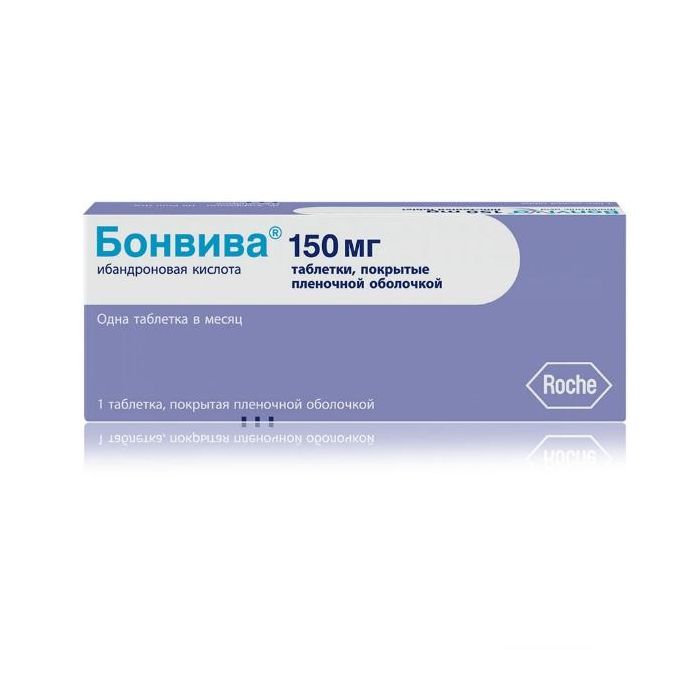Ybandronovaya acid | Bonviva tablets 150 mg, 1 pc.
Special Price
$43.12
Regular Price
$51.00
In stock
SKU
BID463722
Packing
1 pc packaged.
Pharmacological action of
Bonviva has an inhibitory bone resorption effect. Ibandronic acid is a highly active nitrogen-containing bisphosphonate, an inhibitor of bone resorption and osteoclast activity. Ibandronic acid prevents bone destruction caused by blockade of the function of the gonads, retinoids, tumors and tumor extracts in vivo. Ibandronic acid does not violate the mineralization of bone tissue when prescribed in therapeutic doses for the treatment of osteoporosis and does not affect the replenishment of the pool of osteoclasts. The selective effect of ibandronic acid on bone tissue is due to its high affinity for hydroxyapatite, making up the bone mineral matrix. Ibandronic acid inhibits bone resorption dose-dependently and does not directly affect bone formation. In menopausal women, it reduces the increased rate of bone tissue renewal to the level of reproductive age, which leads to an overall progressive increase in bone mass, a decrease in the levels of bone collagen cleavage (concentration of deoxypyridinoline and cross-linked type I and C collagen C and N telopeptides) in urine and blood serum , fracture rates and increased bone mineral density (BMD). High activity and a wide therapeutic range provide the possibility of a flexible dosage regimen and intermittent administration of the drug with a long period without treatment at relatively low doses.
Indications
Postmenopausal osteoporosis with the aim of preventing fractures.
Contraindications
Hypersensitivity to ibandronic acid or other components of the drug.
Hypocalcemia. Before using Bonviva, as with the appointment of all bisphosphonates used to treat osteoporosis, hypocalcemia should be eliminated.
Severe renal impairment (serum creatinine> 200 mol / L (2.3 mg / dL) or creatinine clearance <30 ml / min).
Pregnancy and lactation.
Pregnancy and lactation
Pregnancy
No evidence of direct embryotoxic or teratogenicity was found during preclinical studies. The adverse effects of ibandronic acid in animal reproductive toxicity studies were the same as in all bisphosphonates - a decrease in the number of embryos, a violation of the labor process, an increase in the frequency of visceral anomalies (narrowing of the ureteropelvic segment).
There is no clinical experience with Bonviva in pregnant women.
Breastfeeding period
Excreted in milk in animals. After 24 hours, the concentration of ibandronic acid in blood plasma and milk is the same and corresponds to 5% of the maximum.
It is not known whether ibandronic acid is excreted in breast milk in women.
Composition
1 tab. contains ibandronic acid 150 mg
Dosage and administration
Inside, completely with a glass (180–240 ml) of clean water in the “sitting” or “standing” position, do not go to bed for 60 minutes after taking Bonviva. 150 mg (1 tablet) 1 time per month (preferably on the same day of each month), 60 minutes before the first meal of the day, liquid (except water) or other drugs and food additives. Tablets should not be chewed or resolved due to possible ulceration of the upper gastrointestinal tract. You can not use mineral water, which contains a lot of calcium. If you miss a scheduled appointment, you should take 1 table. Bonviva drug 150 mg, if the planned intake is more than 7 days, and then take Bonviva drug 1 time per month in accordance with the established schedule. If before the next scheduled appointment less than 7 days, you must wait until the next according to the reception plan and then continue to receive in accordance with the established schedule, because You can not take more than 1 table. in Week.
Side effects of
Bonviva, like other bisphosphonates, when administered intravenously can cause a short-term decrease in serum calcium levels.
From the gastrointestinal tract (GIT): dyspepsia (nausea, abdominal pain, flatulence), diarrhea, constipation, gastritis, gastroenteritis.
From the musculoskeletal system: arthralgia, myalgia, pain in the limbs and bones, osteoarthritis.
From the side of the nervous system and mental sphere: headache, dizziness, insomnia, depression.
From the skin and its appendages: rash.
Organism as a whole: flu-like syndrome, weakness, reactions at the injection site, phlebitis, thrombophlebitis, nasopharyngitis, cystitis, urinary tract infections, bronchitis, upper respiratory tract infections, arterial hypertension, hypercholesterolemia, uveitis, scleritis.
Hypersensitivity reactions: angioedema, urticaria.
Very rarely, jaw osteonecrosis was observed with the administration of ibandronic acid.
Drug Interaction
Ibandronic acid does not affect the activity of major isoenzymes of the cytochrome P450 system. At therapeutic concentrations, ibandronic acid is poorly bound to blood plasma proteins, and it is therefore unlikely that it will displace other drugs from the protein binding sites. Ibandronic acid is excreted only through the kidneys and does not undergo any biotransformation. Apparently, the ibandronic acid excretion pathway does not include any transport systems involved in the excretion of other drugs.
Overdose
Possible symptoms: hypocalcaemia, hypophosphatemia, hypomagnesemia.
Treatment: No special information available. A clinically significant decrease in serum calcium, phosphate, and magnesium can be corrected in / in the administration of calcium, potassium, or sodium phosphate and magnesium sulfate, respectively.
Dialysis is ineffective if given 2 hours after administration of the drug.
Storage conditions
At a temperature not exceeding 30 РC.
Expiration
2 years.
Active ingredient
ibandronic acid
pharmacy terms and conditions
dosage form
dosage form
tablets
F. Hoffmann-La Roche Ltd, Schw Iecaria
Write Your Own Review

